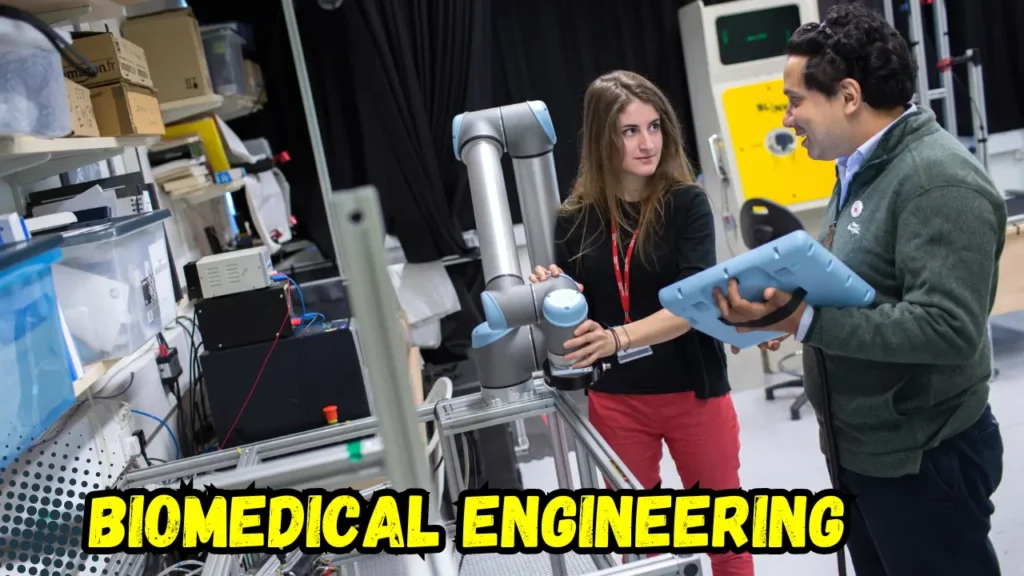Introduction
Biomedical engineering is a multidisciplinary field that blends engineering principles with biological and medical sciences to improve healthcare. This dynamic field is crucial for developing medical devices, diagnostic tools, and advanced healthcare technologies that enhance patient care and treatment outcomes.
History of Biomedical Engineering in Pakistan
Early Beginnings
Biomedical engineering in Pakistan started gaining traction in the late 20th century. Initially, it was considered a niche within broader engineering disciplines, but with the growing need for advanced medical technology, dedicated programs began to emerge.
Key Milestones
Significant milestones include the establishment of specialized departments and research centers in universities, the introduction of undergraduate and postgraduate programs, and increased collaboration between academia and healthcare institutions.

Current Scope of Biomedical Engineering in Pakistan
Integration with Healthcare Systems
Biomedical engineering has become integral to Pakistan’s healthcare systems. From developing low-cost medical devices to implementing sophisticated diagnostic equipment, biomedical engineers are at the forefront of healthcare innovation.
Demand for Biomedical Engineers
There is a growing demand for biomedical engineers in Pakistan due to the increasing need for modern healthcare facilities, medical devices, and diagnostic tools. This demand is further fueled by the government’s focus on improving healthcare infrastructure.
Public Awareness and Impact
Public awareness of biomedical engineering is on the rise, driven by the visible impact of medical technologies on patient care. Biomedical engineers are helping to bridge the gap between medical science and engineering, resulting in better healthcare solutions.
Educational Pathways in Biomedical Engineering
Undergraduate Programs
The journey to becoming a biomedical engineer in Pakistan typically starts with a Bachelor’s degree in Biomedical Engineering or a related field. These programs cover a broad range of subjects, including biology, chemistry, physics, mathematics, and various engineering disciplines.
Postgraduate Specializations
For those looking to specialize further, postgraduate programs such as Master’s and Ph.D. degrees are available. These programs offer advanced coursework and research opportunities in areas like biomaterials, medical imaging, bioinformatics, and rehabilitation engineering.
Continuous Professional Development
Continuous professional development is crucial in this rapidly evolving field. Biomedical engineers must stay updated with the latest technologies and advancements through workshops, conferences, and online courses.

Best Universities Offering Biomedical Engineering in Pakistan
NED University of Engineering and Technology
NED University in Karachi is renowned for its engineering programs, including biomedical engineering. The university offers state-of-the-art facilities and a strong emphasis on practical training and research.
National University of Sciences and Technology (NUST)
NUST is one of Pakistan’s top universities, offering a comprehensive biomedical engineering program. The university is known for its cutting-edge research and collaboration with international institutions.
University of Engineering and Technology (UET) Lahore
UET Lahore offers a well-established biomedical engineering program with a focus on both theoretical knowledge and practical application. The university has strong industry ties, providing students with excellent internship and job opportunities.
COMSATS Institute of Information Technology
COMSATS is another leading institution offering a robust biomedical engineering program. The university emphasizes research and development, encouraging students to engage in innovative projects.
Ghulam Ishaq Khan Institute of Engineering Sciences and Technology (GIKI)
GIKI is known for its rigorous academic standards and research-oriented approach. The biomedical engineering program at GIKI is designed to equip students with the skills needed to excel in the healthcare technology sector.
Career Opportunities in Biomedical Engineering
Roles in Healthcare Facilities
Biomedical engineers can work in hospitals and clinics, where they are responsible for maintaining and troubleshooting medical equipment, developing new medical devices, and ensuring the effective integration of technology in patient care.
Opportunities in Research and Development
R&D is a significant career pathway for biomedical engineers. They can work in research institutions, universities, or private companies, focusing on developing new technologies and improving existing medical devices.
Positions in the Medical Device Industry
The medical device industry offers numerous opportunities for biomedical engineers. They can work in product design, quality assurance, regulatory affairs, and technical support, contributing to the development of innovative medical technologies.

Challenges in the Field of Biomedical Engineering in Pakistan
Resource Constraints
One of the major challenges is the lack of resources, particularly in public sector institutions. Limited funding and outdated equipment can hinder research and development efforts.
Industry-Academia Gap
There is often a gap between academic research and industry needs. Bridging this gap requires better collaboration and communication between universities and healthcare providers.
Recognition and Professional Support
Biomedical engineers in Pakistan sometimes face challenges related to professional recognition and support. There is a need for stronger professional bodies and associations to advocate for the interests of biomedical engineers.
The Future of Biomedical Engineering in Pakistan
Technological Innovations
The future of biomedical engineering in Pakistan is bright, with technological innovations like artificial intelligence, machine learning, and 3D printing poised to revolutionize the field. These advancements will enhance the development of sophisticated medical devices and diagnostic tools.
Potential for Growth
The growing healthcare needs of Pakistan’s population indicate significant potential for growth in biomedical engineering. As healthcare infrastructure improves, so will the demand for skilled biomedical engineers.
Impact of Global Trends
Global trends in healthcare technology will continue to influence the scope of biomedical engineering in Pakistan. Staying aligned with international standards and practices will be crucial for the field’s development.

Conclusion
Biomedical engineering in Pakistan has made remarkable strides, with significant contributions to healthcare improvement. Despite facing challenges, the field is set for substantial growth, driven by technological advancements and increasing demand for modern healthcare solutions. Aspiring biomedical engineers have a promising future, with ample opportunities for career development and impact.
FAQs
What is the scope of biomedical engineering in Pakistan?
The scope of biomedical engineering in Pakistan includes roles in healthcare facilities, research and development, and the medical device industry. The demand for biomedical engineers is growing due to the increasing need for modern healthcare solutions.
Which universities are best for studying biomedical engineering in Pakistan?
Some of the best universities for studying biomedical engineering in Pakistan include NED University of Engineering and Technology, National University of Sciences and Technology (NUST), University of Engineering and Technology (UET) Lahore, COMSATS Institute of Information Technology, and Ghulam Ishaq Khan Institute of Engineering Sciences and Technology (GIKI).
What career opportunities are available for biomedical engineers in Pakistan?
Career opportunities for biomedical engineers in Pakistan include roles in healthcare facilities, research and development, and positions in the medical device industry. They can work in product design, quality assurance, regulatory affairs, and technical support.
What are the main challenges faced by biomedical engineers in Pakistan?
The main challenges include resource constraints, the industry-academia gap, and the need for better professional recognition and support.
How can one become a biomedical engineer in Pakistan?
To become a biomedical engineer in Pakistan, one must complete a Bachelor’s degree in Biomedical Engineering or a related field, followed by postgraduate specializations and continuous professional development to stay updated with the latest advancements.

